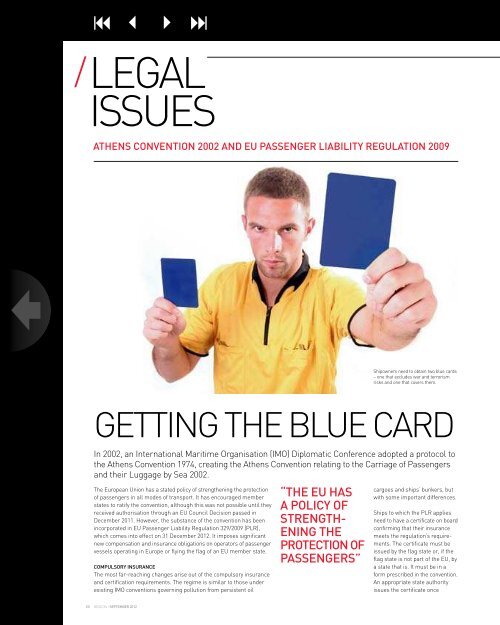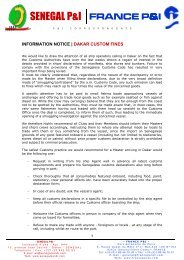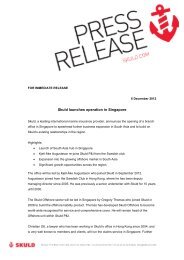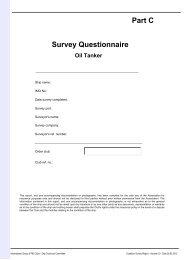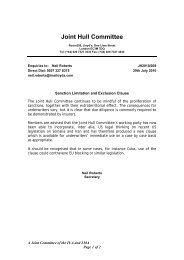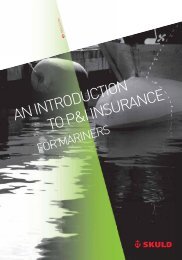Flip book - Skuld
Flip book - Skuld
Flip book - Skuld
- No tags were found...
You also want an ePaper? Increase the reach of your titles
YUMPU automatically turns print PDFs into web optimized ePapers that Google loves.
LEGALByISSUESJonathan HareSenior Vice President, Counsel,Maritime Law & International Group, <strong>Skuld</strong> Oslojonathan.hare@skuld.comLEGALISSUES/Athens Convention 2002 and EU Passenger Liability Regulation 2009Getting the blue cardIn 2002, an International Maritime Organisation (IMO) Diplomatic Conference adopted a protocol tothe Athens Convention 1974, creating the Athens Convention relating to the Carriage of Passengersand their Luggage by Sea 2002.The European Union has a stated policy of strengthening the protectionof passengers in all modes of transport. It has encouraged memberstates to ratify the convention, although this was not possible until theyreceived authorisation through an EU Council Decision passed inDecember 2011. However, the substance of the convention has beenincorporated in EU Passenger Liability Regulation 329/2009 (PLR),which comes into effect on 31 December 2012. It imposes significantnew compensation and insurance obligations on operators of passengervessels operating in Europe or flying the flag of an EU member state.Compulsory insuranceThe most far-reaching changes arise out of the compulsory insuranceand certification requirements. The regime is similar to those underexisting IMO conventions governing pollution from persistent oil“The EU hasa policy ofstrengtheningtheprotection ofpassengers”Shipowners need to obtain two blue cards– one that excludes war and terrorismrisks and one that covers them.cargoes and ships’ bunkers, butwith some important differences.Ships to which the PLR appliesneed to have a certificate on boardconfirming that their insurancemeets the regulation’s requirements.The certificate must beissued by the flag state or, if theflag state is not part of the EU, bya state that is. It must be in aform prescribed in the convention.An appropriate state authorityissues the certificate oncesatisfactory evidence is produced showing that insurance is in place.The evidence takes the form of ‘blue cards’, which are, in effect,guarantees signed by providers of insurance or other financial security.The insurer or other entity providing the blue card is subject to directaction by claimants and unable to rely on policy defences (save forwilful misconduct).TerrorismThis is where it gets interesting. Although PLR contains an exclusionfor acts of war, it leaves open the possibility of carriers being foundliable for terrorist acts. Standard P&I cover treats terrorism in thesame way as war, namely by excluding cover. On top of this, there islimited insurance capacity for war risks, which makes cover problematicfor large-capacity passenger vessels requiring high cover levels.This proved an obstacle to implementation and, accordingly, in 2006the IMO agreed upon a Reservation and Guidelines for Implementation,which provides a framework for two blue cards, one for all risks apartfrom war and terrorism and one for war and terrorism risks. To reflectthe limited capacity of the war risks’ insurance market, liability underthe war and terrorism blue card was capped at SDR 340 million.P&I clubs in the International Group will be able to issue blue cardsthat exclude war and terrorism risks. However, shipowners also needto produce a second blue card covering war and terrorism in order toget the PLR certificate, without which they are unable to operate.Some clubs (but not all) wish to issue these blue cards. A proposal wasrecently made to club boards to extend the scope of the Group’s poolingand reinsurance arrangements to include cover for war and terrorismP&I risks. This had the support of <strong>Skuld</strong>’s board and would havecleared the way for clubs to issue both blue cards. Regrettably thisproposal failed to gain sufficient support. Accordingly, those clubswishing to provide their members with war and terrorism blue cardsare dependent on finding a satisfactory reinsurance programme outsideof the International Group’s pooling and reinsurance arrangements.Domestic trafficWhile the Athens Convention only applies to international traffic, PLRis extended to certain vessels engaged in domestic seagoing voyages.Some states have taken advantage of a provision in PLR enabling themto defer the extension to domestic traffic. While PLR applies to domestictraffic in some states as soon as the regulation comes into force at theend of 2012, in other states it will be phased in over several years.Members need to check the domestic legislation applicable to theirparticular trade.DevelopmentsIt is not yet clear when the convention will come into force. In themeantime, the regulation provides Europe with a regime largelyreflecting the convention.There are a number of potential difficulties which need to be resolvedin the run up to the entry into force of the regulation, the trickiest beingthe issuance of war and terrorism blue cards./Athens Convention 2002Main features/ Death or injury caused by a ‘shipping incident’ 1)- strict liability up to a limit of SDR 250,000(approx. USD 380,000) per passenger- liability up to SDR 400,000 (approx. USD 600,000)unless the carrier proves that the incident causingthe loss occurred without fault or neglect/ Death or injury not caused by a ‘shipping incident’ 1)- liability up to SDR 400,000 if the incident was due tothe fault or neglect of the carrier. The burden ofproof lies with the claimant/ Compulsory insurance of SDR 250,000 per passengerNote: An SDR (Special Drawing Right) is currentlyapproximately USD 1.52.DefencesThe carrier is able to avoid liability if he can provethe incident:/ Resulted from an act of war, hostilities, civil war,insurrection or a natural phenomenon of anexceptional, inevitable and irresistible character; or/ Was wholly caused by an act or omission done withthe intent to cause the incident by a third party1) A shipping incident is one that could not have occurred ina land-based hotel and is defined as “shipwreck, capsizing,collision or stranding of the ship, explosion or fire in the ship,or defect in the ship”.read morewww.skuld.com/athens-convention-200220 beacon / September 2012beacon / september 2012 21


